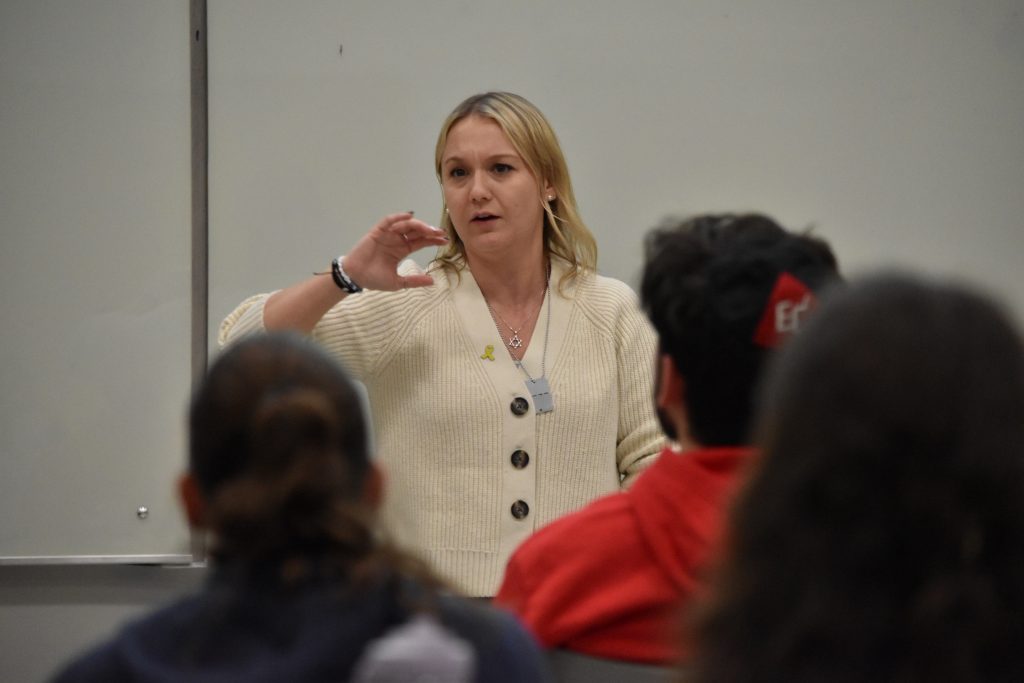Charlotte Korchak, the founder of the Jerusalem Education Institute, led a wide-ranging conversation with students on the “core concepts and misconceptions” that people have about Israel, Zionism and the Jewish people. The talk was hosted by the Binghamton University Zionist Organization last Wednesday.
Korchak was previously a senior educator at StandWithUs, an “international, non-partisan education organization that supports Israel and fights antisemitism,” according to the group’s website. Her family moved from Los Angeles to Israel when she was 9 years old before leaving in 2002 during the second intifada.
Korchak said she witnessed acts of violence like shootings and stabbings during that time, adding that she lost three of her friends in a suicide bombing when she was 14. She said that this experience “laid the groundwork” for her work today and that looking at how Israeli and Jewish people coped after Oct. 7, the trauma she experienced persists.
“It hasn’t ended, because we still have people being held hostage, and this war is still ongoing, and there’s a lot going on,” she said. “There’s a lot going on even beyond the war. There’s a lot going on when it comes to politics in Israel.”
“And then, of course, let’s put aside Israel and jump here to college campuses,” she continued. “We’re dealing with antisemitism at a higher rate than we’ve ever dealt with before, and at the same time, we’re being gaslit about that antisemitism and people telling us that it’s not real or that it’s justified based on what’s going on.”
Korchak discussed Jewish identity, saying Jewish people across the diaspora share a common history, culture and language and that their traditions cannot be fully practiced “unless you’re in the land of Israel.” She then discussed the origins of “modern Zionism,” which emerged in the 19th century, and said Zionism has “been around and persisted in Jewish tradition for 2,500 years.”
Theodor Herzl, who published an influential 1896 pamphlet calling for the creation of a Jewish nation, is widely considered to have founded the political Zionist movement. Korchak said that all Zionists “believe in a Jewish state in the land of Israel” but often disagree on other policies or tactics.
“The hard part is that within every movement, there are always going to be extremes,” she said. “And there are, of course, extremes in the Zionist movement today, and it’s hard because some of those extremes actually sit inside of the Israeli government, and that makes people think that that is mainstream, or that is representative of the whole, which it is usually not.”
Korchak characterized opponents of Zionism as ignoring Jewish people’s right to self-determination. She also criticized Zionists who believe that Palestinians do not have the same right, saying that “we also have to check our own hypocrisy.”
While addressing the diaspora’s diversity, Korchak said Jewish people are indigenous to and have lived in present-day Israel for thousands of years, but that Palestinians are also native to the same land.
She then discussed Jewish migration during the late 19th and early 20th centuries and said these arrivals did not steal land but purchased it at high prices from Arab landowners. From 1882 to 1918, Jewish immigrants established “58 small settlements, kibbutzim, moshavim, and urban areas” in Palestine, according to a book by Kenneth Stein, a former professor at Emory University. Immigration to the area rapidly increased, with around 232,000 Jewish immigrants arriving in the 1930s, according to the United Nations.
Korchak said the native renters “felt like their land was being stolen from them.”
“That isn’t the truth, but that was their perception of it,” she said. “And people were displaced, and you could understand their anger and their frustration that’s going to fester as time goes on, and that builds up that tension that will create the modern-day conflict that we now are in.”
Korchak characterized the 1948 Arab-Israeli War, which began one day after the Israeli Declaration of Independence was proclaimed, as being about survival. The war led to the forced displacement of around 750,000 Palestinians from their homes, an event known in Arabic as the Nakba. She said some atrocities were committed against Palestinians during the war, including the expulsion of entire villages.
Turning to Israel’s actions in the Gaza Strip since Oct. 7, Korchak said Hamas prevented food and humanitarian aid distribution into the region and that Israel tried to open several pathways for assistance to reach northern Gaza. In March, Israel announced a pause in sending humanitarian aid to Gaza following the end of a temporary ceasefire. U.N. Secretary-General António Guterres criticized the blockade last week and said that “more than an entire month has passed without a drop of aid into Gaza.”
“I don’t think there’s any evidence out there that someone can ever introduce to me that would convince me that the Jews don’t have the right to a state,” Korchak told Pipe Dream after the discussion. “But that doesn’t mean the Palestinians don’t also have a right to a state. And I think that’s, again, the more you talk to Palestinians, the more that’s the perspective that now I hold very strongly.”



